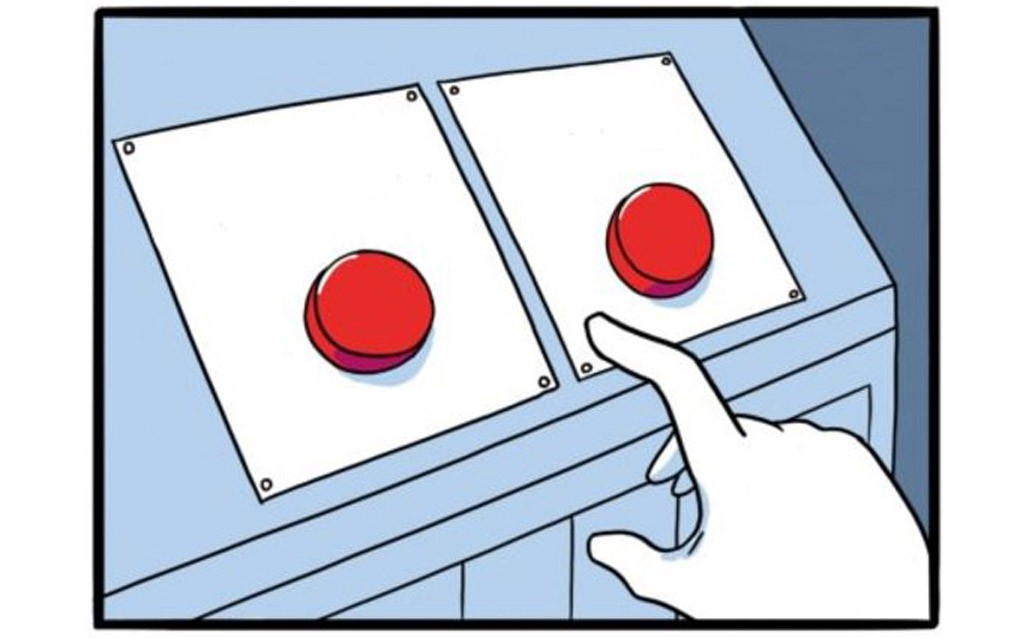
Joshua Citarella
🚨CONTENT WARNING AHEAD 🚨
Near the end of 2018, I wrote an article about TikTok and Gen Z. My piece focused on generational differences in social media use. I argued that, broadly speaking, Millennials are individualist, entrepreneurial, and focused on a personal brand while Gen-Zers are collectivist, nihilistic, and interested in identity play. A few weeks later, InfoWars’ Paul Joseph Watson made a video, The Cultural Significance of TikTok, which awkwardly retrofits my text as a seeming endorsement of his right-wing agenda. Watson describes TikTok as a cultural battleground in which Gen-Z rebels against the overreach of Millennials’ political correctness.[^1] At the time of writing, the video has 800,000+ views on YouTube. There are several versions circulating online. It’s also become a topic in its own right, sparking threads on various right-wing message boards including 4chan’s /pol/. A roast appeared on the satirical news website NPC Daily.
To be sure, numerous publications released articles about TikTok when it was trending on the App Store late last fall. Some writers mentioned concerns about offensive content and hate speech. Just about everyone was shocked to see how young TikTok’s user base is. The media’s response quickly came to a head with a VICE Motherboard article bearing the outrageous headline "TikTok Has a Nazi Problem," spawning further replies by conservative YouTuber Sargon of Akkad, among others. For the space of a few days, TikTok was a frontline in America’s ongoing culture war.
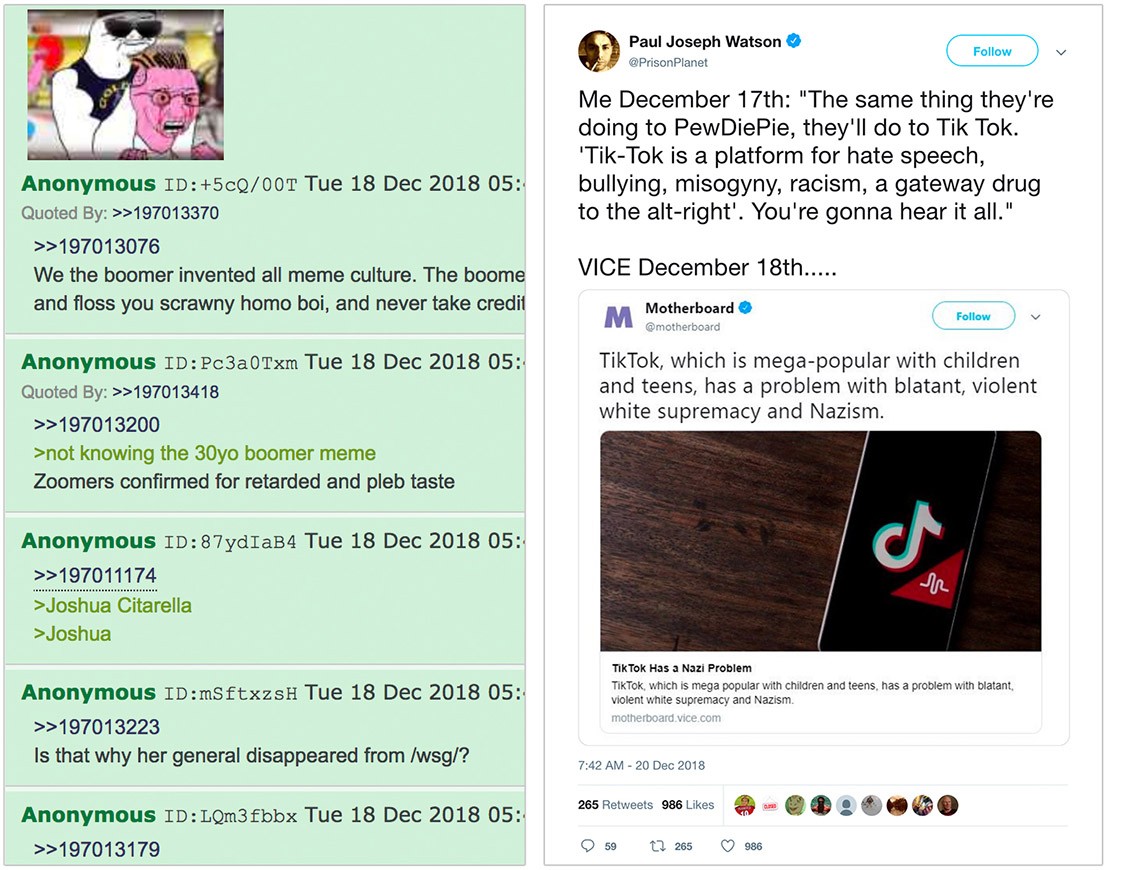
History shows that reactionary politics, especially among young people, flourish in times of declining wealth and labor market prospects. In observing the online content teenagers produce, we can see that Gen Z has learned to expect less than earlier generations. Given that real wages have been stagnant for nearly forty years, life expectancy is declining, and the environment is collapsing, this makes sense. Things are getting worse. The burgeoning youth conservative movement and the generational realignment Watson proposes stand as strong evidence for the need for a materialist Left.
Gen Z’s online activity suggests that many in this age cohort do hold conservative values (or at least enjoy the identity play of a conservative position within our current media landscape). But it must be noted that Gen Z also includes a rapidly growing progressive movement. Across all spheres of American society, the center is failing. As fewer people are able to access the benefits of the mainstream, alternative narratives have begun to flourish and citizens move further toward the polarized edges of the political spectrum.
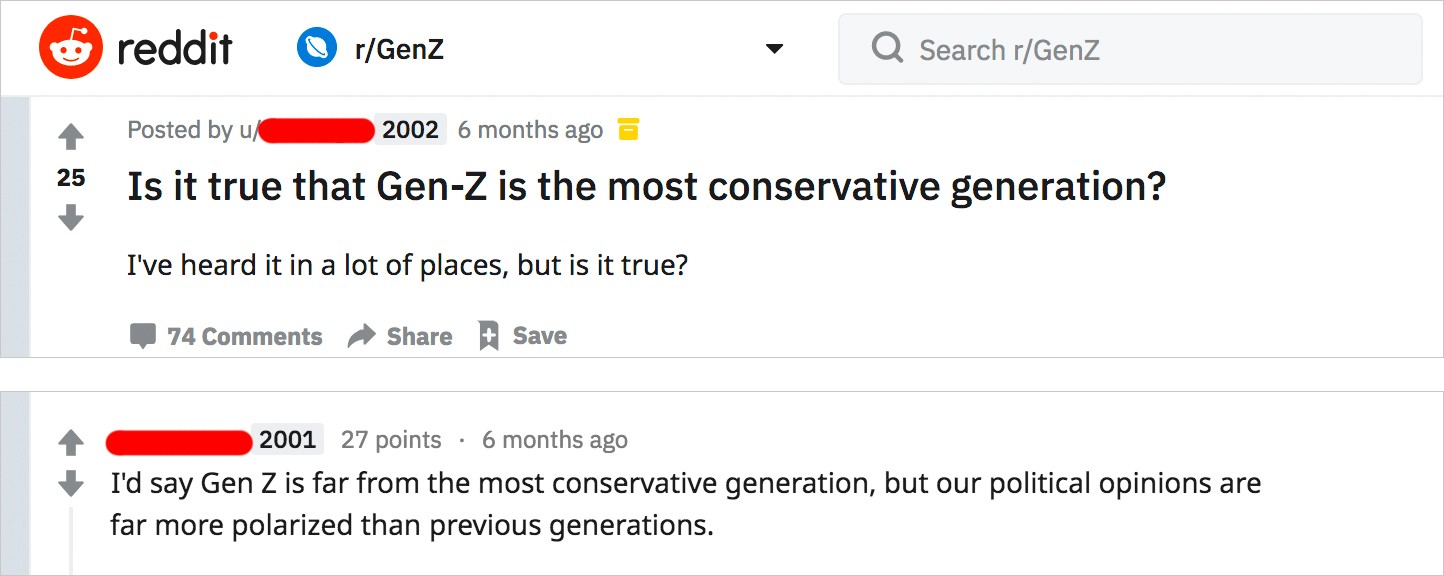
Irony and Capitalist Realism
Americans born after the era of Reagan and Thatcher inherited a world where multiple radical projects had recently failed or been popularly discredited. Centralized states like the USSR had collapsed, the communes of the '60s-'70s had long-since been deserted and seemingly all revolutionary potential had been dissolved into a system of global capitalism. We couldn’t restructure society but neither could we opt out. The vast archive of the internet effectively flattened the past and contributed to the pervasive feeling that we were indeed living at the “end of history.”[^2] This shift away from historical perspective helped to foreclose our political imaginations and was celebrated by the capitalist doctrine as “the end of ideology” and end of class struggle overall.[^3]
To insulate ourselves from these seemingly guaranteed failures, Millennials, and Gen Z after us, adopted irony as a cultural strategy. Irony allowed us to continue life under late capitalism while psychologically sheltering ourselves from the demoralizing reality. Irony as culture became: “The band I like will inevitably sell out, so I might as well buy-in early.” Irony as politics became: “The movement will inevitably be corrupted, so I might as well side with capital.” Ultimately, it was okay that a project failed because irony allowed us to maintain the plausible deniability that we “never really liked it to begin with.” Why resist, if alternatives are impossible?
In the mid-00s (or when Millennials were the age that Gen Z is now), the mainstream was wearing ironic T-shirts of bands they didn’t like. The enthusiasm may have been insincere but it was paid for in real dollars. This disingenuous mode of consumption was the first breach between the world of ironic aesthetics and social reality. Soon, irony didn’t so much signal active engagement as it suggested an underlying political nihilism, allowing one to disassociate from the real world effects of one’s own actions. The inertia of ironic consumption and production continued to accelerate right up until 2016—at which point the Pepe-style trolls of the Alt-right made it clear that irony had never been apolitical. Ironic propaganda functions the same as real propaganda. Ironic voting is just voting.
Irony after 2016
The past few years online have been a disastrous field test for the political efficacy of irony. The Unite the Right rally in Charlottesville, VA, (August 2017) proved to be a watershed moment for the racist trolls of 2016. As the IRL events played out, 4channers were physically pushed out of white nationalist demonstrations. And once it became ‘real,’ most of the Pepe kids called it quits. Almost overnight, the Barrens Chat aspect of the Alt-right disappeared. Those that remained had become hardened ethno-nationalists who felt no need to cloak their message in irony.
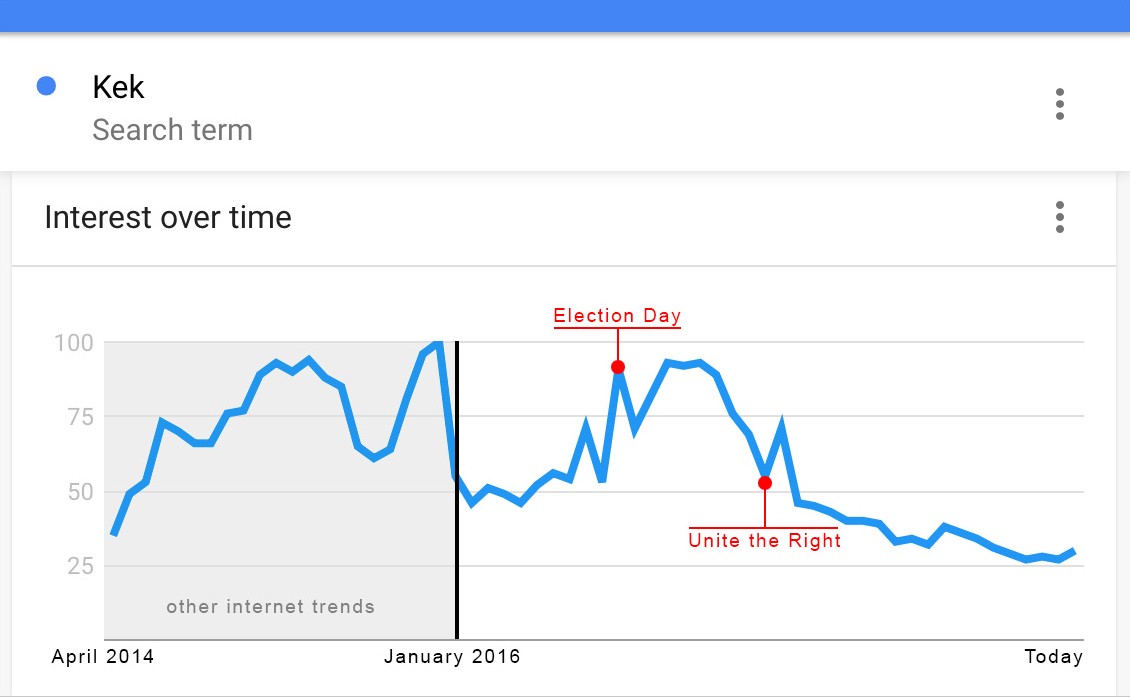
After Charlottesville, conservative culture warriors like Watson and Sargon—wary of moral culpability and deplatforming—quickly tried to distance themselves from the Alt-right. Today, their worldview and careers hinge on the fuzzy distinction between rhetorically libertarian positions (which may contain implicit references to white identity) vs. the explicit racist agenda of the new online Right. Self-preservation precludes them from recognizing how their audience may serve as an incubator for further radicalization.
As TikTok is still a largely ‘normie’ and tightly moderated platform, it has become a tactically useful talking point for alternative social media stars (and gamer celebrities like PewDiePie). So long as TikTok can float in the limbo of irony, these culture warriors will defend it. Losing this battle would be admitting defeat on the greater front.
Gradients of Politicization
In the fall of 2018, I, like most observers, believed that the mass appeal of edgy trolling had come to an end. I was therefore surprised to see a style qualitatively similar to the early-2016 use of Pepe emerge on TikTok.
I want to be clear that TikTok trolling culture is distinctly different from the troll culture of 4chan. TikTok troll content is produced for a wide and nondescript online audience while 4chan trolls primarily use misanthropic in-jokes which signal back to their own niche community. While TikTok’s troll content is offensive and outrageous, it does not, thus far, resemble the targeted harassment campaigns of the Alt-right. TikTok trolls are mad at the world and criticize the abstract phantom of “libtards” but they do not (yet) have intent to cause suffering for specific individuals. A public video making fun of someone is acceptable but a barrage of private messages is not. This distinction is important because it reveals an underlying difference in the individual motivations for these two groups and will impact effective policy prescriptions.
To further analyze the content Gen Z produces on TikTok and other platforms, I want to propose a framework within which we might classify it along gradients of politicization. These specific terms and their definitions have been tactically muddied by the Right but the general arc of progression remains clear.
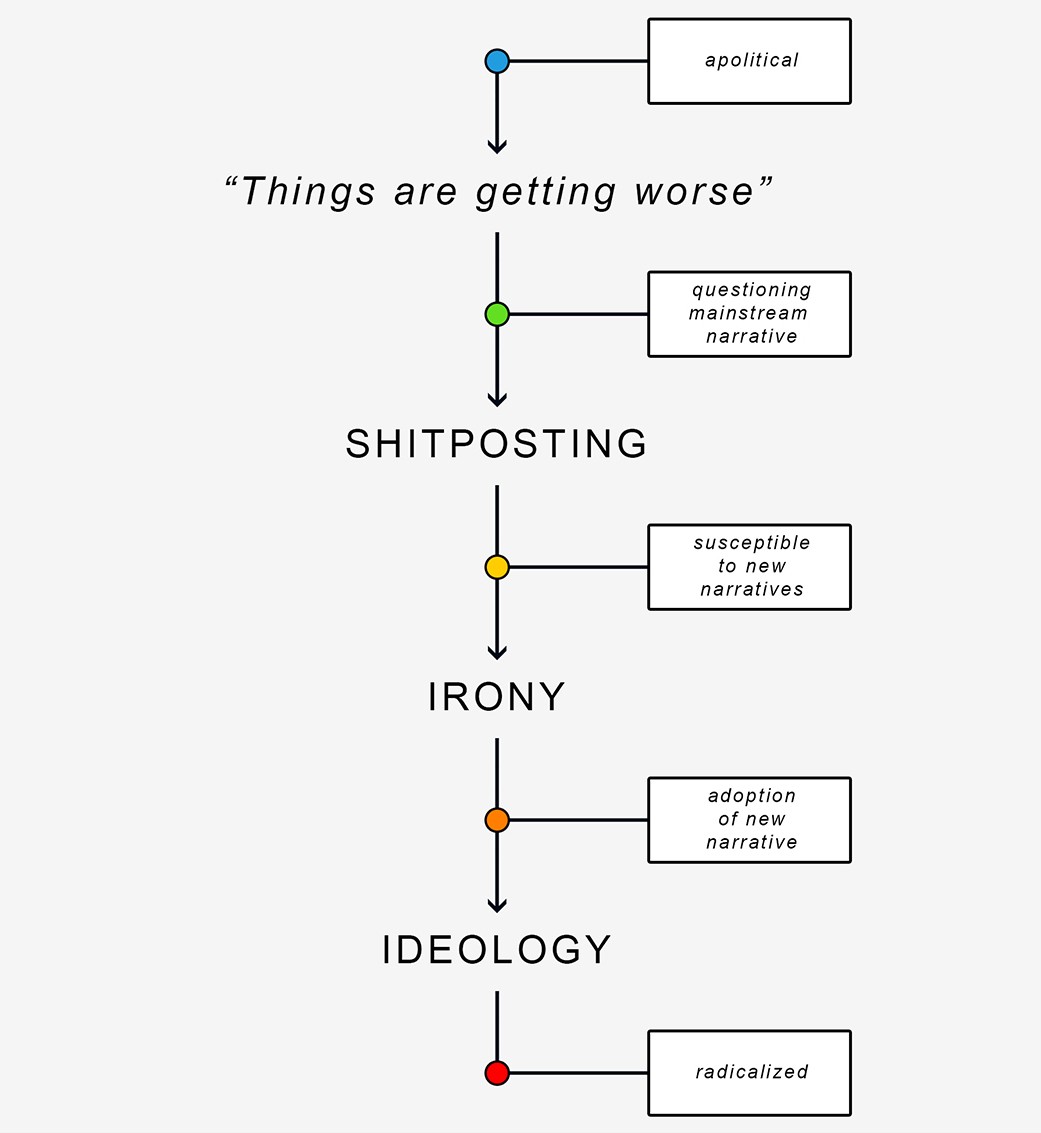
Shitposting Doesn't Scale
Before the context collapse of large scale networks,[^4] shitposting performed an important social function within small scale message boards. Within these communities, indeterminacy was essential to the process of meaning making. Shitposting was a way of proposing ideas that existed potentially outside the bounds of the Overton window and whose delineation helped to define the moral and ethical codes of the collective. Often uncertain of what they themselves believed, users would push an idea to its hyperbolic extreme in an attempt to find their group’s collective limit. Once breaching the consensus codes within their community, they would privately scale back to calibrate where they in fact stood on the issue.
This process worked reasonably well on gaming forums in 1999. Not so much today. Perhaps this style most appropriately tracks onto small scale networks like group DMs. Shitposting is also a way of re-asserting individual freedom within online collectivities. The power of any one individual to derail a thread reaffirms the autonomy of all individuals within the group and subsequently gives value to the instances where users do cooperate.
Virtue Signaling to the Right
Clearly, many TikToks are cut and dry examples of racism or misogyny, often internalized. Content like this is not altogether surprising as the videos are produced by and for a mostly white audience of transgressive teenagers. Yet to dismiss these videos entirely risks losing an important insight about the younger generation and the emergent cultural forces now shaping our political reality.
We should take notice that the overwhelming majority of edgy teens on TikTok are not living out the ideology they profess online. Themes of gender inequality have worked their way into most every meme format on the platform. Yet despite the popularity of videos where young women describe themselves as “property” or voluntarily “go back to the kitchen,” these users are not actualizing their “Trad Lyfe” values. The re-emergence of so-called Christian conservatism doesn’t seem to result in any increase in church attendance. Instead, they seem to be spending most of their time making antagonistic memes on social media. Further exploring these users’ pages reveals the abundance of ideological inconsistencies one might expect from contrarian teenagers: One video appears superficially racist, yet the next video shows them mocking police officers and, further down, we see them collaborating in duets with transgender users. The online content teens produce is a slurry of zeitgeist issues about which they themselves may not yet know what they truly believe.
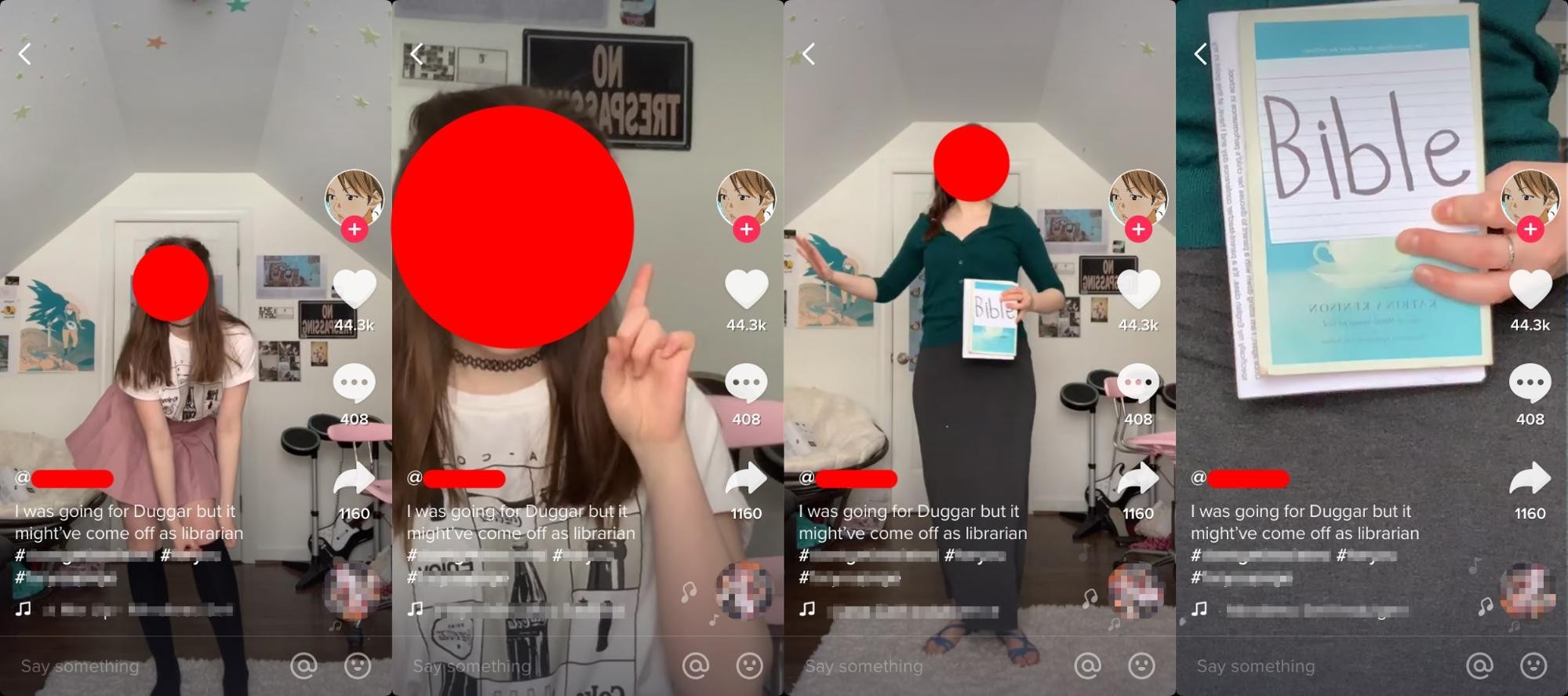
If young people are advocating for a return to conservative values in their online posts but not in their actions, we must ask: Why are young people virtue signaling toward the Right? Underlying the emergence of youth reactionary culture is the glaring failure of neoliberal capitalism to deliver on its promises. Young Americans will face the worst economic odds of any post-war generation. Life expectancy continues to drop (most dramatically in Red states).[^5] Teenagers cannot identify the causes of this general decline but they have already internalized its downward trajectory. Their grandparents’ single-earner income provided for a four person household. Their parents’ same family unit now struggles to reproduce its standing with two earners in the workforce. Just a few years ahead of them, Millennials with multiple roommates all tweet about the perils of student debt and freelance precarity. These material conditions, combined with the real existential threat of climate change, make Gen Z acutely aware that they are living at the end of an era; that they were born on the other side of the so-called “end of history.”
Since teenagers rarely have much interaction with government, they tend to understand platforms, the media, and even the entertainment industry as a single homogenous ruling order. Reinforcing this is the fact that many came into their early adult awareness during Obama’s presidency, a time when Democrats, the media class, and tech platforms were seemingly immutable allies. For many in Gen-Z, this perception has crystalized into a progressive neoliberal establishment toward which they now direct all of their frustrations. Young people’s lack of historical awareness and well founded anxieties about the future make them especially vulnerable to the charlatan tactics of right-wing culture warriors. As the failures of neoliberalism become clear, young people attempt to distance themselves from the culture that they, in some ways correctly, understand to have robbed them of their future. TikTok trolling is a backlash to diminishing expectations in American life.
The Shared Grievance
This understanding of Gen Z's worldview and leanings is not speculative. Their everyday posts are literally an itemized list of grievances in plain, uncloaked language and these core complaints are nearly unanimous across all corners of the political spectrum.
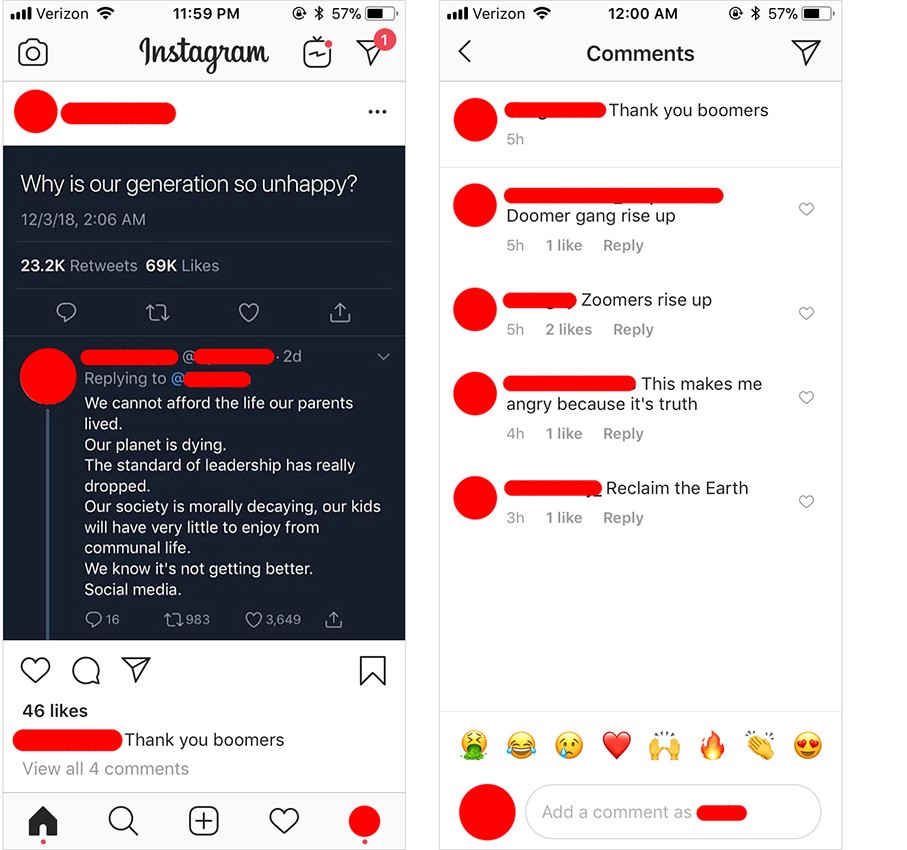
While today teenagers tend to be seen by Western culture as dependents, not yet fit for war, politics, or work, it is worth noting that most revolutions, historically, have been led by young people. Teens are becoming politicized because they have been handed a world in crisis.
The lesson of 2016 is clear, the center is failing. For many of us on the Left, the blame rests with the Democratic Party who, over the past few decades, has de-emphasized its support of labor issues while doubling down on financial deregulation and technocratic solutioneering.[^6] For young people in a political landscape whose only options are a dead-end future or a return to brutal hierarchies of the past, there is, as right-wing influencers will tell them, seemingly no choice. Reactionary politics flourish most when it is difficult to imagine a better future.
Near Future Struggle
That the edgy teens of TikTok are now enlisted in the culture war is self-evident. But what is often less clear—or opportunistically overlooked by partisan pundits—is that they are seldom properly politicized. For the time being, they are still frustrated teenagers expressing a deep-seated dissatisfaction with the current order. Much of the content they produce is stylistically similar to the early-2016 use of Pepe; more intent on antagonizing and demonstrating their power to speak than proposing a clearly strategized political project.
At this moment, the edgy teens of TikTok are deeply susceptible to new narratives. They are open to lines of thinking that fall at the limits of general acceptance, which is to say potentially outside the boundaries of capitalist realism.[^7] American culture already places young people on an incline tilted toward the Right. If left to marinate in this skeptic space, many of them will likely become radicalized.[^8]
Rather than prematurely deplatforming these users or amplifying their message through outrage, as the media did frequently in 2016, we should understand this content as the first inklings of political dissent and target these users for counter narratives. Ultimately they should be recruited into leftist political projects. Before entering this skeptic space, many teens do not know of progressive options outside the mainstream Democratic Party. Without further frame of reference, leftist critiques of the center often register just as strongly as the Right with these soon-to-be politicized teens. (Perhaps this is why Watson knows that he can safely smuggle in contradictory ideas because most of his audience is not yet able to discern the difference.)[^9]
Pushback is important. Left-wing counter-narrative YouTubers like Shaun, Contrapoints, Zero Books and others, as well as Twitch streamers like Destiny and Hasan Piker are on the frontline in this battle for young people’s hearts and minds.[^10] The Right did this extraordinarily well leading up to 2016 and the cascading effects were felt throughout all of social media and mainstream culture. Members of this generation are the primary producers of online content. They also do it for free. Over the past four years of closely observing this space, I have observed innumerable users undergo radical transformations in their beliefs provided they are exposed to new ideas. At the center, one finds teenagers shuffling between Left and Right on issues like guns and abortion; at the far edges, transgender fascists un-ironically supporting animal rights and global genocide. Some of the same teenagers who ran Pepe meme accounts in 2016 are now young Marxist scholars who spend their evenings gaming and chatting about Hegel in Discord servers with PhD students. I wouldn’t believe it myself if I hadn’t met them. The Overton window for Gen Z online political spaces is infinite.
The cultural nichification of the internet is producing communities so polarized that they have almost no concept of a shared reality or grand narrative. Political projects generally recruit from the one-third of Americans at the apolitical center. But as the internet culture wars now politicize more people at increasingly younger ages, this strategy must be re-examined. Most members of Gen Z are first exposed to the far-reaching and robust propaganda infrastructure of right-wing social media as children. By the time they reach middle school (around age 13), they are already fully familiar with it. The key for this proposal would be to find those young users who have properly identified their generational grievance, are currently mired in existential irony, and are now receptive to a narrative intervention.
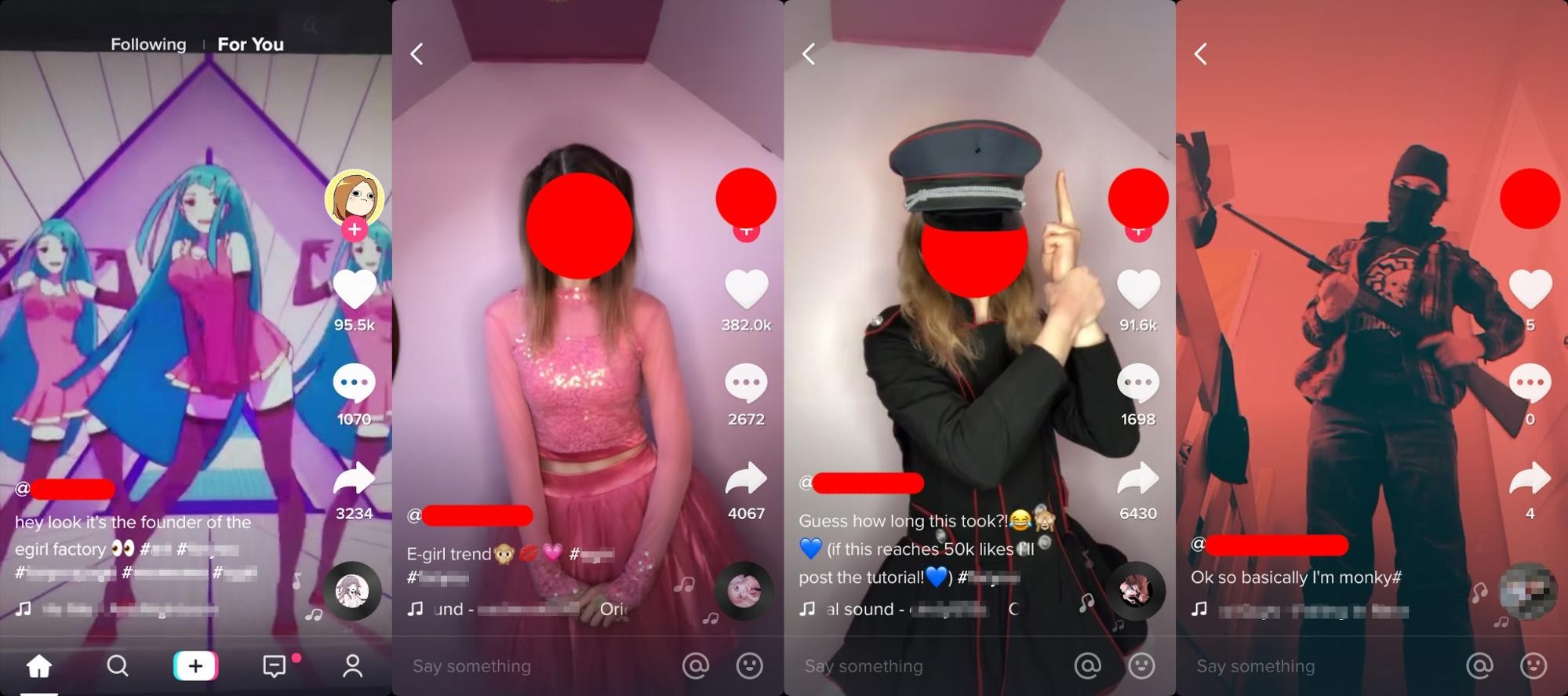
The rise of the new online Right is the downstream effect of neoliberalism. In the long run, there is no solution without political change. At this moment, the best tactic for mitigating the surge of rightward radicalization is to algorithmically prioritize leftist counter narratives on social media.
Plugging Holes in a Sinking Ship
To be sure, moderation will stem the flow but cannot prevent the slow creep of reactionary content. Under close moderation, the small circle of deep alt-right TikTok has mostly stopped producing original content. In their new videos, they hide their faces behind ski masks and disapprovingly stare into the camera, “bearing witness.” Yet despite even the best efforts, dog whistles and evasive signals are inevitably constructed. For example, TikTok banned videos of firearms only to have the use of Nerf guns emerge as one of the platform’s most popular trends; and where swastikas are not allowed, fascists will post the iron cross or the black sun. Loopholes such as these exist on every platform. On TikTok, the “Crusader” functions alternatively as Skyrim cosplay and a tacit sign for Islamophobia. It conjures an image of Christian Europeans engaged in a war against Muslim foreigners. Numerous crusader cosplay accounts exist (the most popular is named after conservative pundit and apartheid apologist Ben Shapiro). Their mantra and most common hashtag is “Deus Vult.”

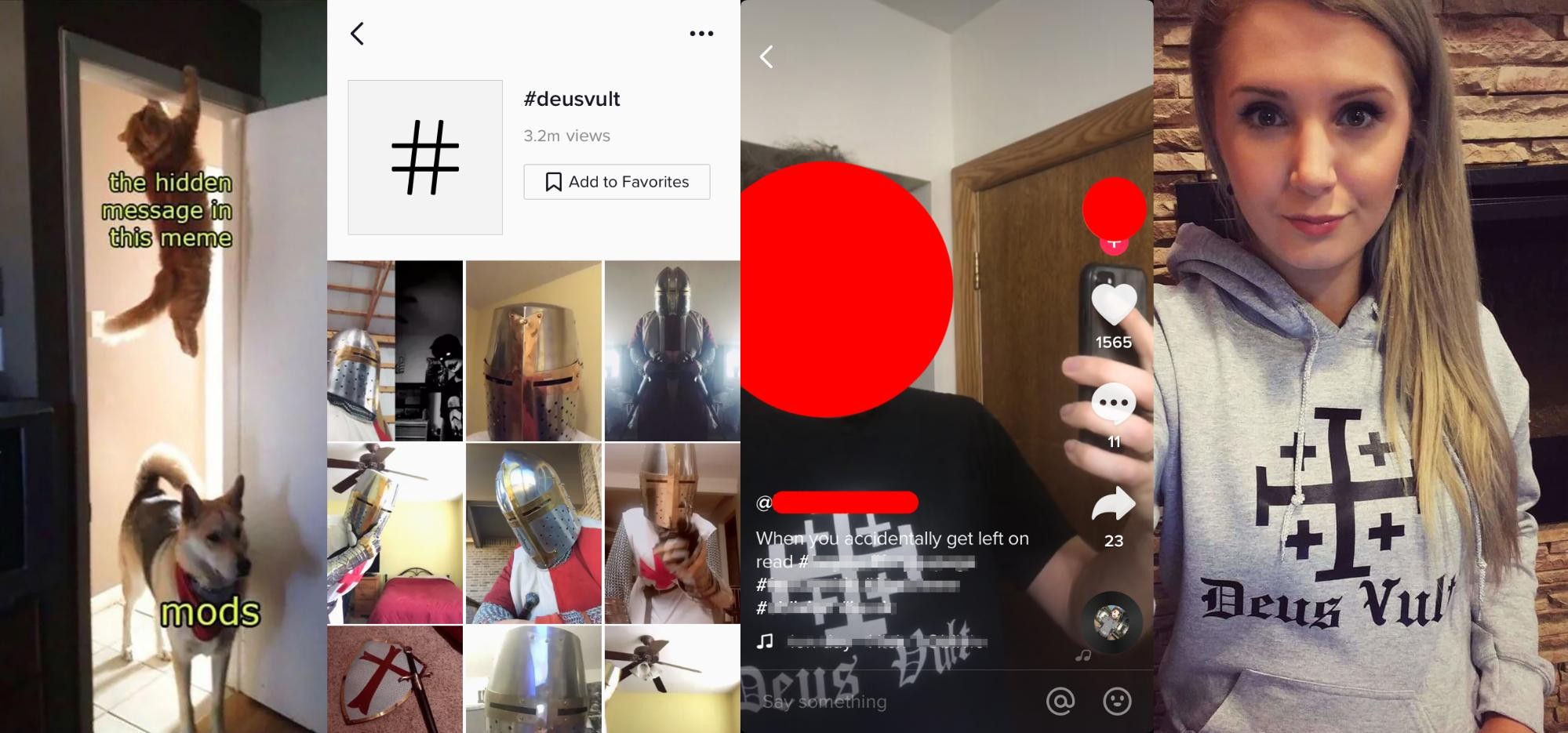
The hazard begins when these memes begin to circulate among users who do not have earnestly held political beliefs. Catchy aesthetics can transmit ideas that make you laugh first and radicalize later. Along these gradients of politicization, many of the users on the early side of this spectrum do not yet fully understand the implicit messaging of the content they reproduce. But other users do. These evasive tactics, combined with an uncertainty over the intentions of specific users, have created an arms race between meme makers and platforms. Fascist content producers now attempt to poison ever more benign symbols and force platforms to flag increasingly more content as they attempt to stay ahead. Their goal is to accelerate this process and bait platforms to take down more and more posts until they inevitably remove content that has no political orientation. This ill-use of deplatforming is then cited by far-right groups as confirmation that young conservatives are indeed under attack. The trajectory of this conflict points to an inevitable rate of slippage between implicit and explicit messaging, where the whack-a-mole strategy of content moderation serves as a recruiting tactic for the far Right.
As one TikTok crusader put it:
The Politics of Cringe
Cringe compilations are hard to watch. You feel terribly embarrassed for the person in the video.
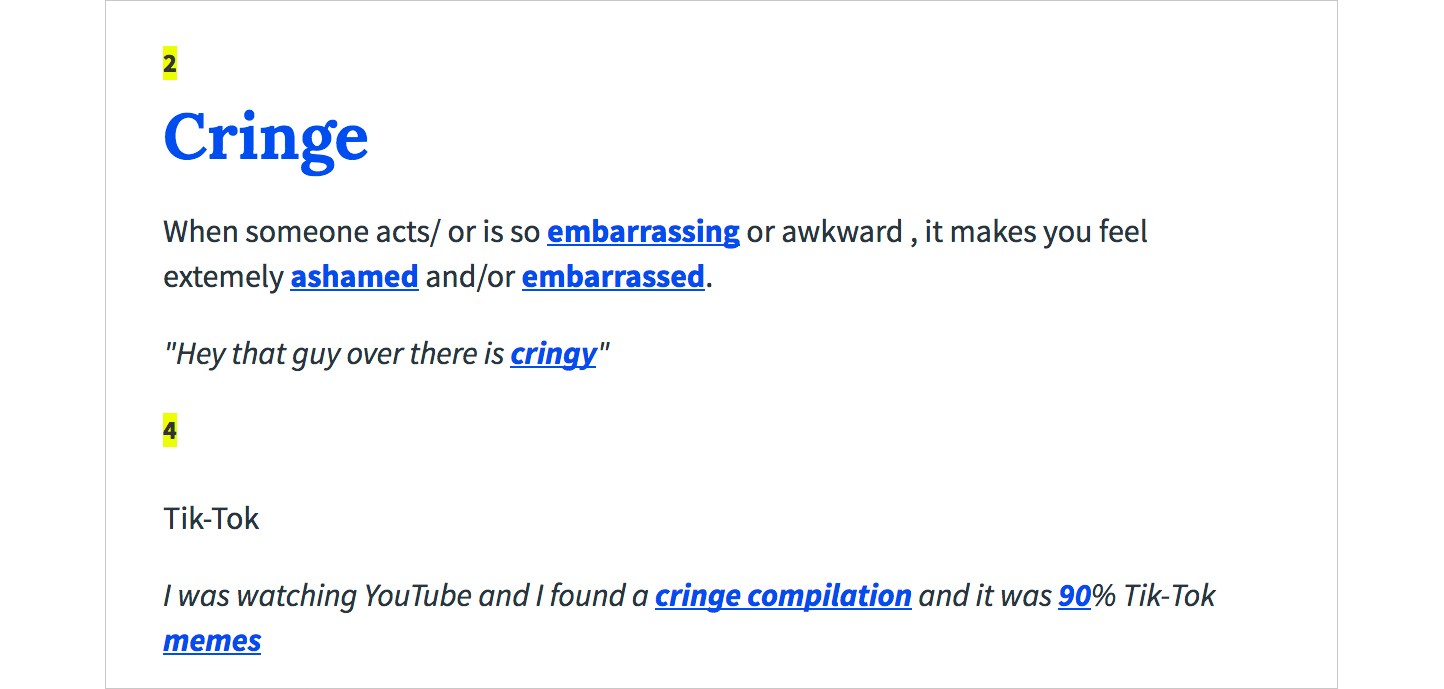
There has been much debate over whether the rise of the new online Right is “real” or some kind of elaborate LARP. It’s worth pointing out that actual politics is already incredibly larpy and cringe AF. And it is precisely this suspension of disbelief that makes it powerful. It allows us to envision another world, even if just for the duration of a party meeting or a D&D game. Taking political action feels unbelievably embarrassing to Millennials (again, which I am) who were raised in a culture that only really believed in “not believing in anything.” Choosing a symbol for our political movement feels strangely similar to designing a tabard for our guild in World of Warcraft. If we can understand irony as masking our true intentions and recognize LARP as the process of world building essential to any radical movement, the Venn diagram of IRL and URL politics becomes a circle.
Perhaps cringe compilations are a new form of therapy intended to rehabilitate our political imagination. These videos generally consist of conventionally unattractive people (often with craniofacial deformities) embarrassing themselves through a lack of sophistication. These videos cater to the misanthropic gaze of ironic detachment and almost always revolve around distinctions of taste level (i.e., class). What begins as awkward embarrassment, eventually gives way to reveal striking moments of deep connection with these users. Millennials will be awed by these performers’ willingness to be unironically vulnerable. Maybe the revolution isn’t going to be cool. Maybe it's just a human connection with an off-duty bus driver unglamorously belting out their favorite pop song.
Continued exposure to cringe content might allow us to recapture our lost humanist values. As a culture, we are now attempting to work through irony and arrive again at a place of real beliefs. We now systematically increase our tolerance to cringe so that we can join the political movement without fear or shame. Cringe is the antidote for late capitalist nihilism. That's why the ironic crusaders want to stomp it out.
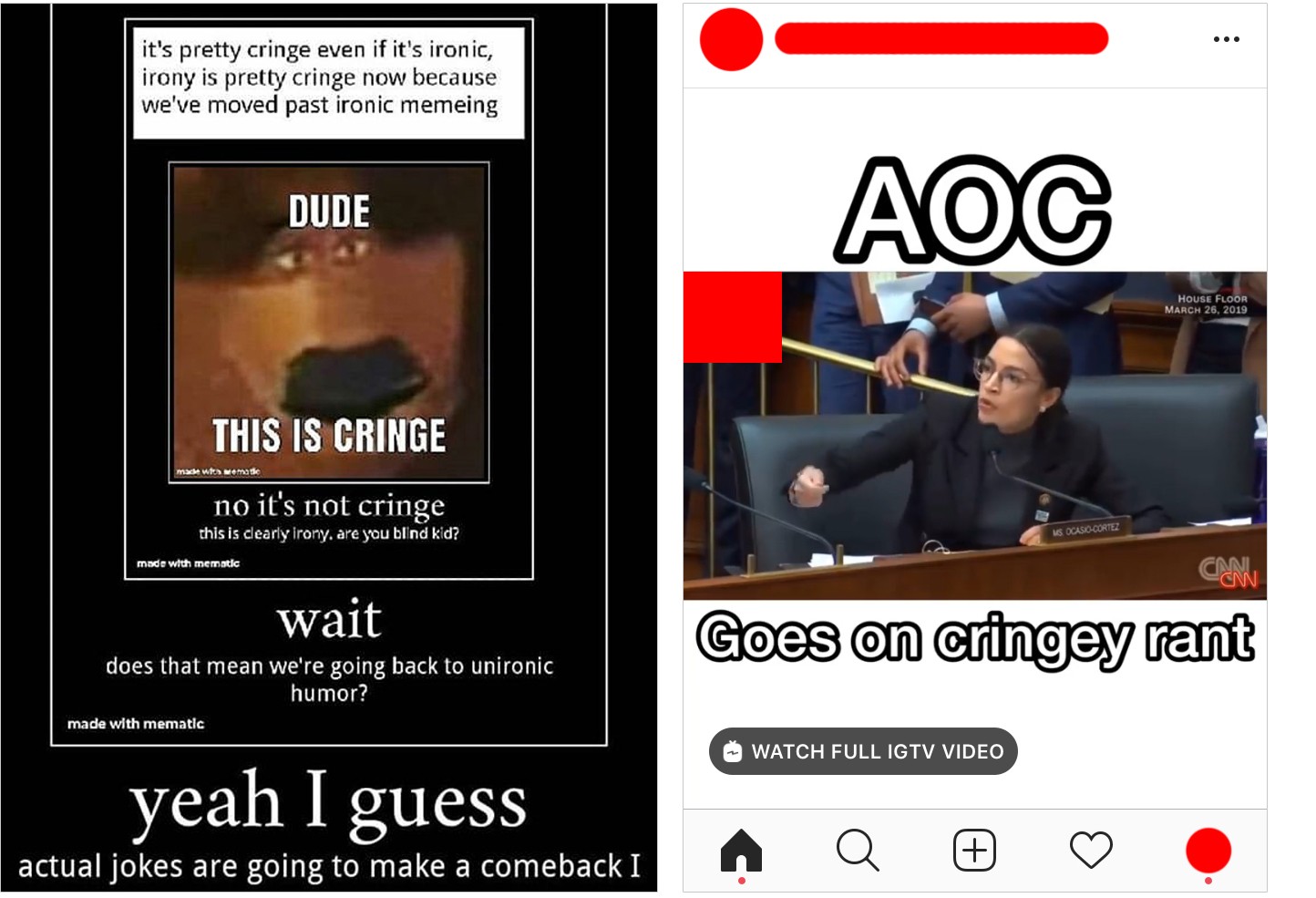
Closing Remarks
Memes are mental viruses. They create positive feedback loops. Unlike most other forms of media, memes do not tend to fatigue or oversaturate their viewers. Instead, the more one sees a meme, the more one wants to see that meme more. In this way, memes function as a type of exploit in today's attention economy. Potent memes will get stuck in your head for days. Once the concept takes hold, it becomes difficult to mentally steer out of. Memes nudge our way of thinking. They become a type of augmented reality, overlaying the world and social relationships.
TikTok is a place where young users are actively forming their politics. TikTok resonates with Gen Z for various reasons, among them the duet chain (“I relate to your post by building on it with mine”) resembles the Marxist dialectic of individual autonomy within collectivity. In the crisis handed to them, young people have already realized that their own political interests are more aligned with collectivities than the type of California Ideology and libertarian individualism built into networks like Facebook or Instagram.[^11] If channeled correctly, youth frustration has the potential to become a revolutionary political force.
A youth movement signaling away from liberalism is significant because it reveals the center establishment’s lack of a real vision for the future. Under the mantra of demographic change (an ever increasing population of young people and growing racial diversity), liberal Democrats have assumed they can wait out the inevitable victory over aging white conservatives. This faulty assumption has prevented much of the liberal Left from considering the true appeal of their message. Failure to present a compelling political option will lose increasing numbers of young people to nihilism, to the Right, and ultimately to fascism. Public wealth is the only real solution to our crisis.
➖
➡️Addendum
The murder, this year, of 50 muslim worshippers in Christchurch, New Zealand was accompanied by a manifesto that advocates for “edgy humor and memes in the vanguard stage.” The manifesto shares its name with a YouTube video by Lauren Southern (shown earlier in the Deus Vult sweatshirt). Southern borrowed this title and argument from the white nationalist organization Generation Identitaire who had appropriated it from French theorist Renaud Camus. The aforementioned YouTuber Shaun has a well researched video response, "The Great Replacement Isn’t Real." In the Christchurch killer’s manifesto, the word “crusade” is used in reference to a race war. Three days before the attack, the killer posted a meme to his Facebook page that depicted a crusader strangling a muslim woman with the line, “The weak should fear the strong.” Previous to publishing this text, I wrote to TikTok and alerted them to this content.
➖
⚙️Appendix: Notes on Deplatforming
Deplatforming is ultimately a necessary tool (and it is often best practice for public institutions to not engage in debate with the far Right). In regard to social media, the risk for blowback is widely discussed and generally well understood. The question of free speech on social media, and more precisely the coordination between the state and privately owned monopolies, will undoubtedly become a major issue in the next few years, and very likely one that will be tried on the level of the supreme court. Looming questions of Antitrust regulations or nationalization are inevitable but for now remain relatively distant priorities.
In writing about TikTok, Vice/Motherboard fell for what 4chan troll communities call “journo bait.” As shown in the article’s screenshot, the video had been posted by an account with less than 50 followers and had only six likes. Moreover, the video had been given several conspicuous hashtags in a seeming attempt to attract journalists looking for this very content, incite outrage and, in doing so, be broadcast at scale. Part of an on-going cross-platform propaganda campaign that began in 2017, this very same video is still up on YouTube and has ~24,000 views. Its obscurity on TikTok compared to the enormous traffic of a site like Motherboard Vice is a near perfect example of the Streisand Effect.
To understand how content moderation has had a seemingly net-neutral effect on far-right political speech, we must zoom out and view the question within a larger ideological framework. The concept of deplatforming is rooted in the liberal notion that people’s political opinions are solely the result of ‘bad ideas in their head.’ Yet for every right-wing influencer that gets banned, another one seems to pop up taking their place. Deplatforming has thus far not achieved its intended effects because the desire for this content is political (or material) in origin and not the result of individual bad actors on social media. The mass appeal of far-right ideas arises from historically predictable conditions (i.e., Golden Dawn) that are now accelerated by technology and the internet. We can’t ‘solve’ the rise of the Alt-right through content moderation. The best defense against identitarian populism is a thriving middle class.
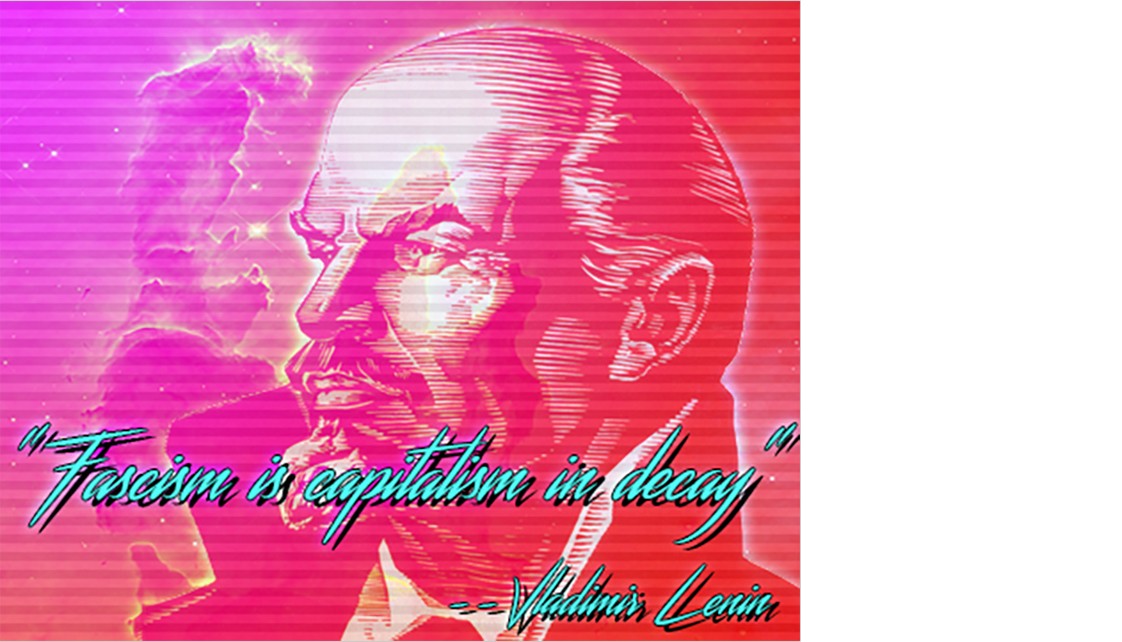
As we set precedents for deplatforming, we might first run through the following thought exercise: When a Left political movement looks to redistribute the trillions of wealth hoarded by Silicon Valley tech companies, will these these social media platforms still be on our side? Or might they instead use their power to deboost or deplatform us?
Joshua Citarella is an artist based in New York. Published April 2019
For further discussion: 🎧 NM Podcast ep. 14: Shift Alt Right Clique, 2019, feat. Joshua Citarella in conversation with New Models editors about the writing of this article.
Notes
1 Paul Jospeh Watson commented, "Gen Z is a natural, evolutionary, self-correcting antibody to the Millennial pathogen that has infected our culture." "The Cultural Significance of TikTok" (YouTube, Dec. 17, 2018)
2 Francis Fukuyama, “The End of History?” The National Interest (1989)
3 Fredric Jameson, “An American Utopia: Dual Power and the Universal Army” (2016)
4 Also see: Poe's Law
5 It may not be possible to gather definitive data but my strong inclination, which is shared by other researchers in the field, is that the majority of these teen users live in conservative districts.
6 Thomas Frank's Listen, Liberal: Or, What Ever Happened to the Party of the People? (Picador, 2016) is probably the best read about this recent history.
7 See: Mark Fisher's Capitalist Realism: Is There No Alternative? (Zero Books, 2009) or check out Zero Books on YouTube
8 Irony posting opens a gap of cognitive dissonance. Radicalization is often discussed as being motivated by a desire for cognitive closure through the adoption of clear narratives.
9 It is also likely that Paul Thomas Watson is tactically lifting arguments from left-wing thinkers, especially those who have come under fire from the social justice Left, such as Mark Fisher. Watson’s recent video "Has Our Culture Hit a Dead End?" (Mar. 2019) is nearly a shot for shot remake of Fisher’s essay and lecture "Slow Cancellation of the Future" (May 2014).
10 See: Faraday Speaks’s "My Descent into the Alt-Right Pipeline" (YouTube, Mar. 2019). In online spaces where RW extremism has become the norm, these content producers offer one of the few ways out.
11 See: Richard Barbrook and Andy Cameron, “The California Ideology” (1995), and Fred Turner, From Counterculture to Cyberculture: Stewart Brand, The Whole Earth Network, and the Rise of Digital Utopianism (U. Chicago, 2006).